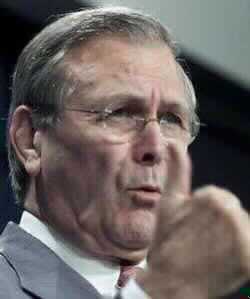HIGHLIGHTS: U.S. Press Reports Speak of Activity Spotted at Iraq Weapons Plants|| U.S., Iraqi Opposition See Post-Saddam Democracy||Experts: 'Iraq Would Be no Push over for U.S.'||Spanish Foreign Minister Cautions U.S. on Iraq||Speculation About a Future Attack Not Sufficient for a State to Use Force against another, Warn International Law Experts|| STORY: U.S. intelligence agencies spotted activity last week at an Iraqi plant identified as a biological weapons production facility, The Washington Times reported in Wednesday edition.
A convoy of about 60 trucks was photographed by a U.S. spy satellite at a known biological weapons facility last week," the paper quoted U.S. intelligence officials as saying, adding that the site was located about six miles northwest of Baghdad.
The Washington Times report on the truck convoy near Taji followed a Washington Post report earlier this month that U.S. intelligence was looking for a suspected Iraqi biological weapons laboratory north of Baghdad.
The Post quoted U.S. government officials as saying the plant, with 85 employees, may be producing a weapon-sized version of the lethal virus.
U.S., IRAQI OPPOSITION SEE POST-SADDAM DEMOCRACY
U.S. Defense Secretary Donald Rumsfeld said on Tuesday Iraqi opposition leaders visiting Washington seem to agree on the principles of a democratic Iraq to take shape after President Saddam Hussein's downfall.
Rumsfeld, who talked with opposition leaders on Saturday, said they generally voiced "broad agreement ... that a post-Saddam Hussein Iraq ... be a country where there is respect for minorities, there is rule of law, where people have an opportunity to participate in their government and in the way their government behaves and does things."
The opposition leaders, whose top-level meetings with U.S. officials signify the new weight the Bush administration gives to these groups, also agreed that Iraq should be a single country, without weapons of mass destruction, that would not impose its will on its neighbors, Rumsfeld said.
IRAQ HELPED BY SMUGGLING
U.S. defence officials meanwhile say spare parts for Iraq's military are being smuggled from eastern Europe and former Soviet republics, keeping Saddam Hussein's troops prepared for combat despite an international embargo on weapons trafficking, U.S. defense officials say.
The equipment - from truck tires to aircraft parts - is being brought across the border from Syria and Jordan in trucks, officials believe. They commented on condition of anonymity.
The U.N. embargo, in place since the Iraqi invasion of Kuwait in 1990, has stopped Iraq from importing complete weapons systems like combat aircraft or tanks, officials said. But it is able to maintain some of its aging arsenal with the smuggled spare parts.
Iraq would be no pushover for the United States, experts say. Unlike the Gulf War, some Iraqi troops would regard a U.S. attack as an invasion and fight harder to defend their homeland, said Ivo Daalder of the Brookings Institution in Washington.
SPANISH FOREIGN MINISTER CAUTIONS U.S. ON IRAQ
Spanish Foreign Minister Ana Palacio said Tuesday a U.S. attack on Iraq was only hypothetical at this point and urged that any action to depose President Saddam Hussein be guided by international law.
After a briefing by Secretary of State Colin Powell on U.S. policy, the Spanish minister said "the world would be better off without Saddam Hussein."
But she gave no indication President George W. Bush was about to make a decision on whether to employ military, economic, diplomatic or other means.
"This is a hypothesis that I don't think that we should address now. It's not realistic," Palacio told reporters in a joint news conference with Powell.
A U.S. ATTACK ON IRAQ, UNLAWFUL WARN MIDEAST EXPERTS
A U.S. military attack on Iraq without U.N. Security Council authorization would be tantamount to aggression, say Middle East experts and American academics.
"To date, no branch of the U.S. government has officially explained a basis on which an attack on Iraq would be lawful," John Quiqley, professor of law at Ohio State University, said Monday.
He argued that the only basis for one state to use military force unilaterally against another is self-defense against an "armed attack".
"The United States is not being attacked by Iraq. And under the U.N. charter, an armed attack must be ongoing and present. Speculation about a future attack is not sufficient for a state to use armed force against another state," Quigley told IPS.
PHOTO CAPTION
Secretary of Defense Donald Rumsfeld answers a reporter's question during a briefing at the Pentagon in Washington, August 13, 2002. Rumsfeld said Iraqi opposition leaders visiting Washington seem to agree on the principles of a democratic Iraq to take shape after President Saddam Hussein's downfall. Photo by William Philpott/Reute
- Author:
& News Agencies - Section:
WORLD HEADLINES


 Home
Home Discover Islam
Discover Islam Quran Recitations
Quran Recitations Lectures
Lectures
 Fatwa
Fatwa Articles
Articles Fiqh
Fiqh E-Books
E-Books Boys & Girls
Boys & Girls  Women
Women










